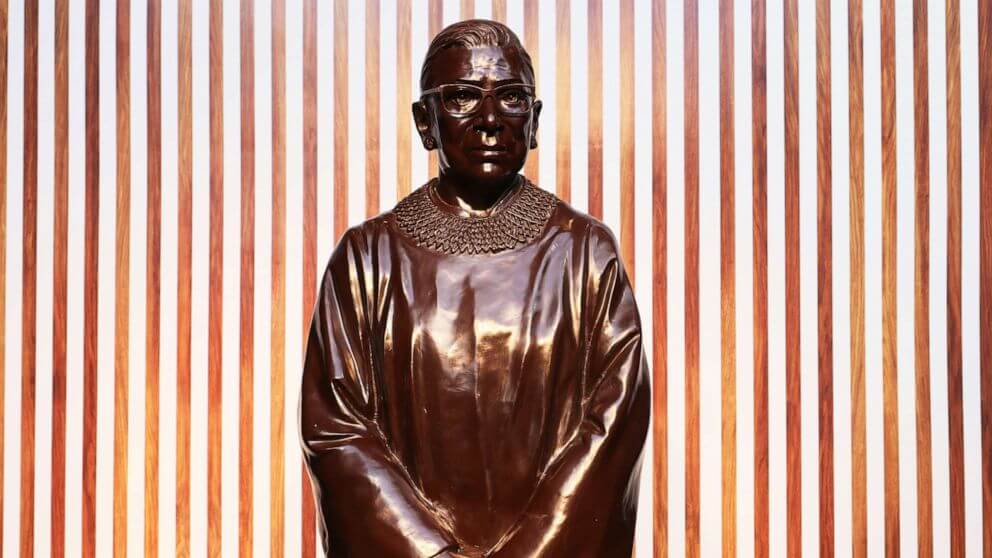
A New Sculpture in Brooklyn Is Dedicated To the Late Supreme Court Justice Ruth Bader Ginsburg
The statue, unveiled to coincide with Women’s History Month, is dedicated to the late Supreme Court justice
Ruth Bader Ginsburg, the barrier-breaking United States Supreme Court Justice who died of pancreatic cancer last September, would have turned 88 years old this month.
In honor of the occasion, reports Randi Richardson for NBC News, Ginsburg’s native Brooklyn has unveiled a new sculpture of the late justice. Brooklyn Borough President Eric Adams also declared Ginsburg’s birthday, March 15, “Justice Ginsburg Day.”
“RBG was clearly a symbol of what’s great about this country and how, when we are inclusive, we can stop the level of exclusiveness that is pervasive throughout this country,” said Adams at the March 13 ceremony, per NBC News.
The statue is now on view at City Point, a residential and commercial development in downtown Brooklyn. Members of the public can reserve 20-minute timed slots to see the sculpture via City Point’s website.
The work’s installation marks a step toward the righting of a nationwide imbalance: namely, the overwhelming number of public statues of historical figures that celebrate white men. As reported in the Smithsonian American Art Museum’s 2011 Art Inventories Catalog, just 8 percent of the 5,193 public outdoor sculptures then decorating the country’s public space depicted women.
Gillie and Marc, a married duo of Australian sculptors, created Ginsburg’s bronze likeness as part of their Statues for Equality project, which aims to draw attention to the dearth of sculptures of women in New York City, reports Sarah Cascone for Artnet News. As the artists say in a statement, the justice was aware of and had “endorsed” the sculpture prior to her death.
Until recently, just 5 of New York City’s 150 statues of historical figures depicted women. But change is coming, albeit incrementally: Public arts campaign She Built NYC is set to install five monuments honoring such individuals as jazz singer Billie Holiday and transgender activists Marsha P. Johnson and Sylvia Rivera throughout the five boroughs. And, in August 2020, Central Park unveiled the first sculpture depicting real women in its 167-year history.
A bronze statue of a short white woman, wearing her Justice robes and standing simply with hands folded in front of her, wearing glasses and her hair in a bun
A new sculpture of U.S. Supreme Court Justice Ruth Bader Ginsburg has been installed in her native Brooklyn. (Courtesy of Gillie and Marc)
Ginsburg was born into a working-class Brooklyn family in 1933. After graduating top of her class from Columbia Law School, she struggled to find a law firm that would hire her.
“I was Jewish, a woman, and a mother,” she recalled in 1993. “The first raised one eyebrow; the second, two; the third made me indubitably inadmissible.”
Undeterred, Ginsburg went on to co-found the ACLU’s Women’s Rights Project and make a name for herself as a fierce defender of gender equality. She served nearly three decades on the Supreme Court, fundamentally altering the landscape of American civil rights—as well as becoming a pop culture icon.
“Ruth Bader Ginsburg did not just create history, she embodied the true origins of the word original meaning by acquiring knowledge through years of inquiry and research and adding her own opinions,” Kim Sajet, director of the Smithsonian’s National Portrait Gallery, told Smithsonian magazine last year. “Armed with a fierce intelligence and a love of analytical reasoning, she fought passionately for all Americans to have equal representation under the law and inspired women in particular, to believe in themselves to make positive change.”
The newly debuted sculpture isn’t the only likeness of Ginsburg set to grace her home city. Shortly after the justice’s death, New York Governor Andrew Cuomo announced plans to erect a public sculpture of her somewhere in Brooklyn. A 23-member commission that includes Ginsburg’s daughter and two of her granddaughters is overseeing the process.
“The final statue reflects her wish to be depicted in a dignified manner,” say Gillie and Marc in the statement.
The artists add, “With the two steps on its large base representing the Supreme Court and the climb she made to get there, the work is designed to provide the public with an opportunity to stand at her side, and gain inspiration from her journey fighting for equal rights.


